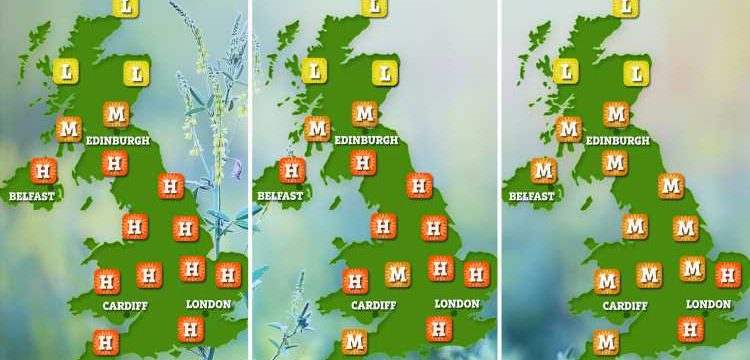MILLIONS of asthma sufferers could be at risk of deadly attacks thanks to a "toxic cocktail" of hot weather and soaring pollen levels.
Britain is set to sizzle this week as an African plume sweeps in bringing temperatures as high as 34C in parts of the country.
The rising mercury will come with sweltering humidity, prompting Public Health England (PHE) to issue a health warning.
PHE issued a level-2 "alert and readiness" warning – and older people have been advised to not go outside during the hottest part of the days this week.
At the same time, pollen levels will be high for most of the country over the coming days – causing misery for hay fever sufferers.
But those conditions can be a deadly mix for the 5.4 million Brits with asthma as hot, humid weather and high pollen levels can trigger potentially-fatal attacks.
Asthma alert
Experts say breathing in hot air can cause the airways to narrow, leading to coughing and shortness of breath.
Dr Andy Whittamore, clinical lead at Asthma UK and a practising GP, said: “A toxic cocktail of hot humid weather and rising pollen levels this week could be extremely hazardous for the 5.4 million people in the UK with asthma, triggering deadly asthma attacks.
"Hot air and hay fever can cause people’s airways to narrow, leaving them struggling to breathe, with symptoms like coughing, wheezing, a tight chest and breathlessness.
"Hot weather can also increase the amount of pollutants, pollen and mould in the air which can trigger asthma symptoms."
He added: “If you are worried about the weather or hay fever affecting your asthma, make sure you take your hay fever medicines, keep taking your regular preventer as prescribed by your doctor and carry your blue reliever inhaler at all times.
"We’d advise you to drink lots of water to prevent dehydration and plan any outdoor activities for earlier in the day when the air quality tends to be better.”
Hay fever hell
It is thought that more than 10 million people in Britain suffer with hay fever – and it affects around 80 per cent of people with asthma.
Grass pollen is the most common allergy and affects 90 per cent of people with hay fever, according to Allergy UK.
How to deal with hay fever
Experts have come up with a number of ways of tackling hay fever.
Specsavers clinical spokesperson, Dr Nigel Best says: "Hay fever sufferers who wear contact lenses may notice the vision through their lenses can appear smeary and eyes can generally feel uncomfortable.
"However, there are some things contact lens wearers can try to help reduce the irritation".
Use drops or ditch the contact lenses
"Contact lens-friendly eye drops can help to calm down any itchiness and wearing prescription glasses (particularly wraparound sunglasses) can prevent pollen from getting into your eyes.
"Those suffering with hay fever could also try daily disposable lenses during the summer months."
Stay inside
Dr Best also recommends: "While it’s not always possible, staying inside when pollen count is high will help to avoid irritation or showering and changing your clothes when you get home will also help to remove pollen from skin and hair."
Use Vaseline
But, it is not just eyes which are affected, hay fever can also cause your ears to become itchy or inflamed.
Specsavers’ chief audiologist Gordon Harrison says: "Allergic reactions can cause the outer ear to itch or swell.
"The middle ear contains the Eustachian tube, which acts as a drainage tube, but when mucus clogs the middle ear it affects that drainage.
"This leads to a build-up in pressure, which can cause discomfort, popping in the ears or earache."
To avoid irritation, try putting Vaseline around the nose to trap pollen, vacuum and dust regularly or you can try over the counter pain relief.
Shower and change clothes often
Showering and changing after being outside will help remove pollen and antihistamines decongestants can help relieve symptoms.
The season runs from mid-May until July, with two peaks – usually the first two weeks of June and the first two weeks of July.
But this can vary depending on where you are in the country and how the weather has been during spring and early summer.
Summer scorcher
People could see their symptoms increase this week as Brits flock to the outdoors as the school holidays kick off with a scorching heatwave.
Forecasters reckon the South of England and London will see highs of 25C from tonight into tomorrow morning, the Met Office said.
If the mercury reaches that mark as expected it would beat the warmest ever UK evening on record.
That was set back in 1948 – when temperatures reached a muggy 23.3C.
The warmest day of 2019 so far was June 29, when 34C was recorded at Heathrow and Northolt in London.
Intense heat is being brought north from a plume of Saharan air – which is already hitting parts of southern Europe with scorching conditions.
Warnings are in place this week as experts say while daytime temperatures are set to hit highs in the mid-30s – it will "feel like" 44C.
The hottest day of the year is expected to fall on Wednesday – as the scorching weather front sweeps the country.
And temperatures will steadily rise throughout the week, forecasters say.
Source: Read Full Article


